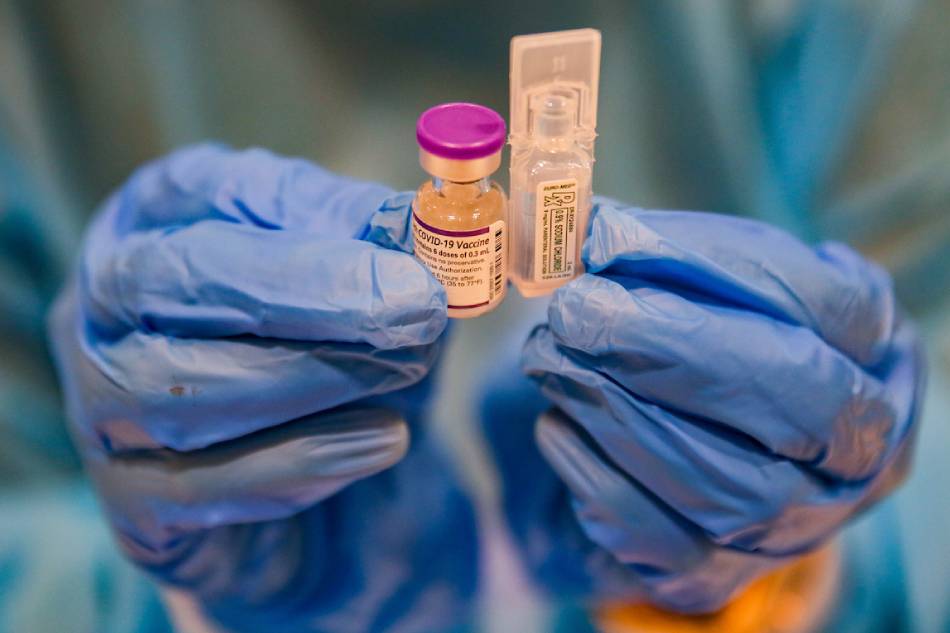Philippines to roll out bivalent COVID-19 vaccines on June 21 | ABS-CBN
ADVERTISEMENT

Welcome, Kapamilya! We use cookies to improve your browsing experience. Continuing to use this site means you agree to our use of cookies. Tell me more!
Philippines to roll out bivalent COVID-19 vaccines on June 21
Philippines to roll out bivalent COVID-19 vaccines on June 21
Davinci Maru,
ABS-CBN News
Published Jun 16, 2023 03:00 PM PHT
MANILA — The Philippines will begin distributing bivalent COVID-19 vaccines to healthcare workers and senior citizens next week, the Department of Health said Friday.
MANILA — The Philippines will begin distributing bivalent COVID-19 vaccines to healthcare workers and senior citizens next week, the Department of Health said Friday.
The modified jabs will be launched through a ceremony at the Philippine Heart Center in Quezon City on June 21, which President Ferdinand Marcos Jr. will attend, the DOH said.
The modified jabs will be launched through a ceremony at the Philippine Heart Center in Quezon City on June 21, which President Ferdinand Marcos Jr. will attend, the DOH said.
The Philippines received early this month some 390,000 doses of the adapted version of the original vaccine from Lithuania.
The Philippines received early this month some 390,000 doses of the adapted version of the original vaccine from Lithuania.
Those eligible for the first phase of bivalent vaccine rollout include healthcare workers and senior citizens who received their second booster shots at least 4 to 6 months ago.
Those eligible for the first phase of bivalent vaccine rollout include healthcare workers and senior citizens who received their second booster shots at least 4 to 6 months ago.
ADVERTISEMENT
The DOH urged eligible Filipinos to get inoculated with the bivalent vaccines, which are modified jabs that target both the original and omicron strains of the virus.
The DOH urged eligible Filipinos to get inoculated with the bivalent vaccines, which are modified jabs that target both the original and omicron strains of the virus.
"Despite the decreasing trend of the COVID-19 positivity rate of 11.6 percent in the National Capital Region as of June 10, we still encourage all eligible individuals to get vaccinated as the threat of infection still continues," Health Secretary Teodoro Herbosa said in a statement.
"Despite the decreasing trend of the COVID-19 positivity rate of 11.6 percent in the National Capital Region as of June 10, we still encourage all eligible individuals to get vaccinated as the threat of infection still continues," Health Secretary Teodoro Herbosa said in a statement.
He stressed that vaccines were proven safe and effective, and also given for free.
He stressed that vaccines were proven safe and effective, and also given for free.
"People should not be complacent, especially the senior citizens who are high-risk individuals and persons taking care of those with COVID-19," Herbosa said.
"People should not be complacent, especially the senior citizens who are high-risk individuals and persons taking care of those with COVID-19," Herbosa said.
The donated bivalent vaccines are set to expire on Nov. 23.
The donated bivalent vaccines are set to expire on Nov. 23.
ADVERTISEMENT
Latest DOH data showed that some 78.4 million Filipinos were fully vaccinated against COVID-19.
Latest DOH data showed that some 78.4 million Filipinos were fully vaccinated against COVID-19.
Of the figure, over 23.8 million have received their first booster dose while almost 4.4 million have gotten the second booster shot.
Of the figure, over 23.8 million have received their first booster dose while almost 4.4 million have gotten the second booster shot.
The Philippines on Thursday logged 528 new coronavirus infections, raising its tally to 4,157,172. Of the figure, some 9,783 are active COVID-19 cases.
The Philippines on Thursday logged 528 new coronavirus infections, raising its tally to 4,157,172. Of the figure, some 9,783 are active COVID-19 cases.
RELATED VIDEO
Read More:
health
Department of Health
DOH
COVID-19
COVID19
coronavirus
virus
pandemic
COVID-19 vaccines
bivalent vaccines
ADVERTISEMENT
ADVERTISEMENT



